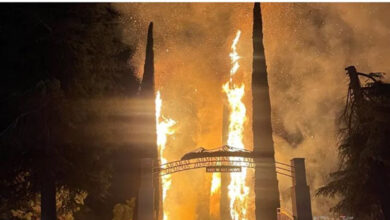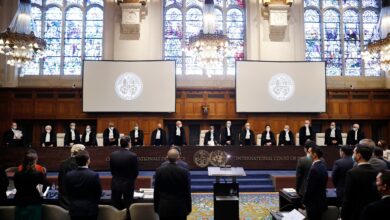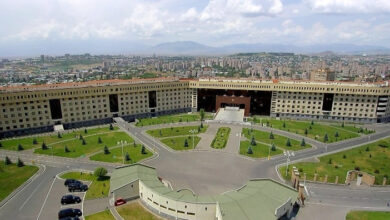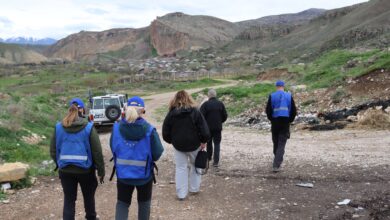Across the Turkish-Armenian divide
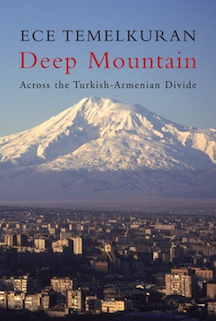
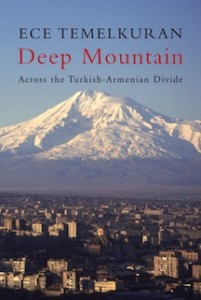 The 98th anniversary of the 1915 tragedy passed last week, but all official moves to bridge the Armenian-Turkish divide are currently on ice and the issue appears to have taken a back seat. There was a time not so many years ago when the question was firmly in the headlines – a brief, tentative diplomatic thaw that ultimately petered out. In fact, that wasn’t just an official semi-glasnost, but a cultural one too. Journalist and writer Ece Temelkuran’s “Deep Mountain” was first published in 2008, presenting Turkish readers with a bold new title dissenting from the official line of the state. In it, Temelkuran set herself the ostensibly simple task of meeting Armenians, talking to them, listening to them, and reporting back for the Turkish audience. Eschewing the directly political, she preferred “to write about Armenians, not necessarily what happened in 1915,” and while this may seem like a modest undertaking to an outsider, in Turkey at the time it was a taboo-shaking exercise, the Hurriyet Daily News writes
The 98th anniversary of the 1915 tragedy passed last week, but all official moves to bridge the Armenian-Turkish divide are currently on ice and the issue appears to have taken a back seat. There was a time not so many years ago when the question was firmly in the headlines – a brief, tentative diplomatic thaw that ultimately petered out. In fact, that wasn’t just an official semi-glasnost, but a cultural one too. Journalist and writer Ece Temelkuran’s “Deep Mountain” was first published in 2008, presenting Turkish readers with a bold new title dissenting from the official line of the state. In it, Temelkuran set herself the ostensibly simple task of meeting Armenians, talking to them, listening to them, and reporting back for the Turkish audience. Eschewing the directly political, she preferred “to write about Armenians, not necessarily what happened in 1915,” and while this may seem like a modest undertaking to an outsider, in Turkey at the time it was a taboo-shaking exercise, the Hurriyet Daily News writes
The book is divided into three parts, the first detailing Temelkuran’s encounters with the Armenians of Armenia itself, the other two her meetings with the Armenian Diaspora in France and the United States.
Whilst bitter enmity for Turks exists, the Armenian Armenians are perhaps most concerned with the practical matter of getting their border with Turkey open again, thus securing an economic lifeline. In contrast, the Diaspora Armenians in France and the U.S. have come to adopt 1915 as the essential, irreducible feature of their identity. Meeting countless businesspeople, community leaders, academics, and artists, Temelkuran describes the trajectory that emerges again and again: How the first generation of migrants to Europe and America were most concerned with “getting on” and fitting into the adopted culture, and how it is only with the second and third generation – threatened by the identity-engulfing vortex of Western “melting pots” – that 1915 has been revisited and latched on to as an unshakable, almost pathological core.
As one of the Los Angeles Armenians revealingly says: “You need to create an identity, something to hold on to both culturally and individually. Turkey’s refusal to recognize the genocide is what binds those of us in the Diaspora. Were the genocide to be recognized, it would probably be the end of us.”
Pain has become “the pillar propping up the home,” and to release that pillar means oblivion. Similarly, many Turks – afraid of losing their country and seeing recognition as threatening their own oblivion – cling just as fast to their own selective amnesia. At one point, Temelkuran strikingly describes it as a “huge industry,” not just of politics and money, but a psychological industry, an “industry of anguish.”
The most sympathetic portraits in the book are thus reserved for those who are able to understand and rise above this identity paralysis, recognizing the reductiveness of a political “debate” that goes little deeper than one side screaming “It was genocide!” with the other responding “No it wasn’t!”
The book occasionally lapses into worthiness, though not nearly as often as you fear when you read the following meaningless fluff early on: “If an Armenian were to lose their way one day anywhere in the world, they’d be able to locate the capital of Armenia by consulting the map of their heart. They would navigate toward it by reference to the coordinates of pride and fear, of mourning and loss.”
Temelkuran concerns herself with the personal and the human as a kind of riposte to the debilitating rancor of the official, political dispute. She successfully charts a precipitous course between two entrenched sides that long ago stopped listening to one another, never condemning anything other than this willful deafness. Of course, Turkish-Armenian relations are currently off the news agenda, but if they are ever officially repaired it will be in no small part down to re-humanizing books like this one, which helped break the first ice a few years ago.




